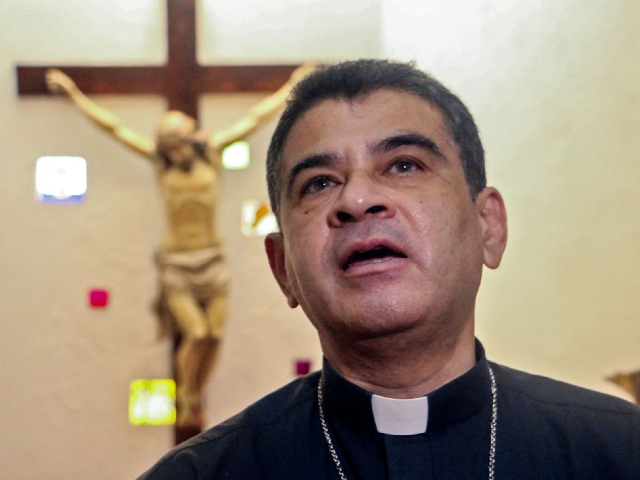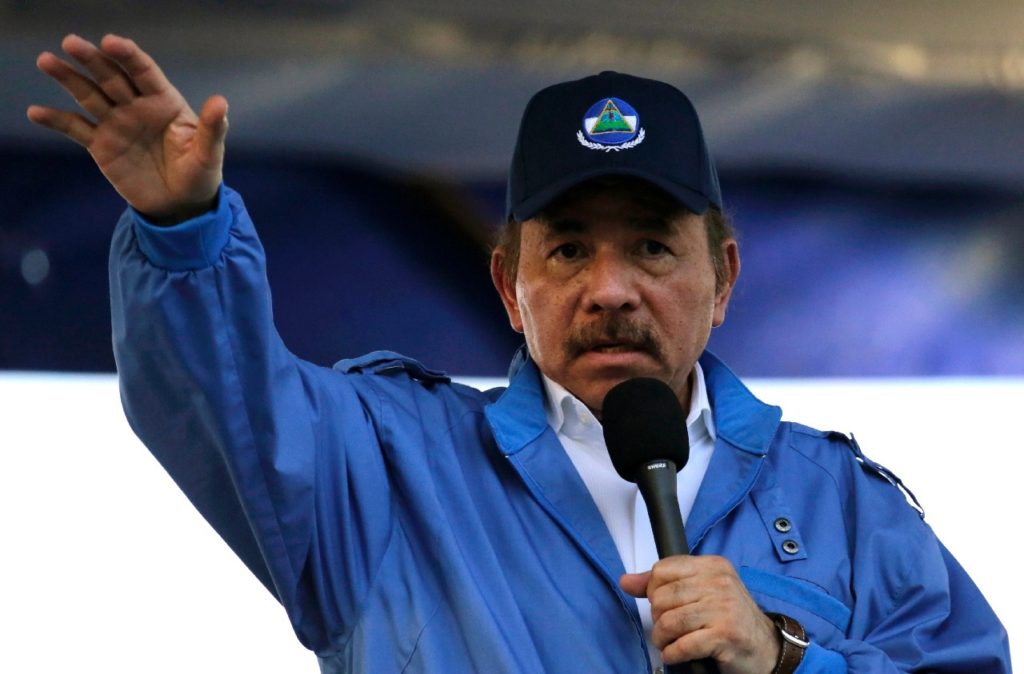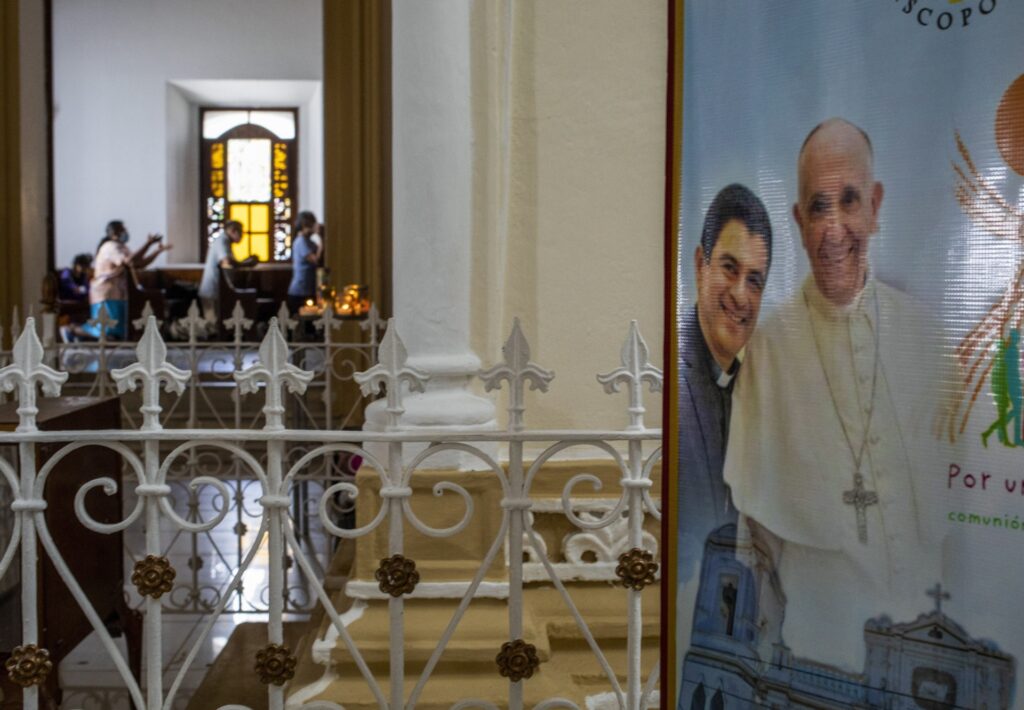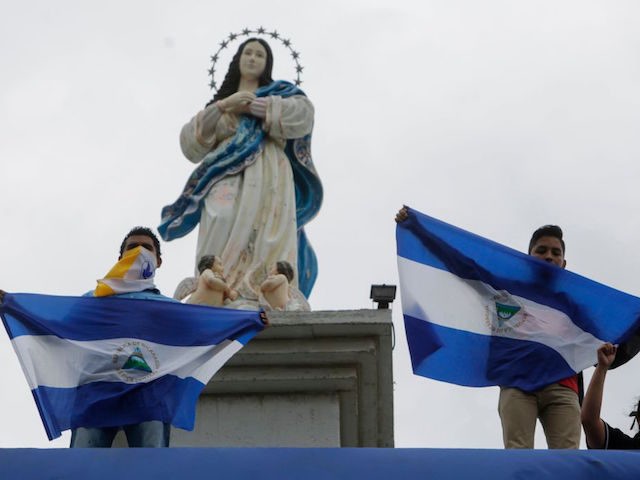Catholic leaders throughout Latin America have raised their voices in the past week against the persecution of fellow faithful in Nicaragua, particularly condemning the sentencing of the bishop of the Diocese of Matagalpa, Monsignor Rolando Álvarez, to 26 years in prison for “treason.”
The actions of the Sandinista regime of Daniel Ortega against Bishop Álvarez are the latest moves in a years-long campaign against the Catholic Church in Nicaragua.

Nicaraguan Catholic bishop Rolando Alvarez speaks to the press at the Santo Cristo de Esquipulas church in Managua, on May 20, 2022. (STR/AFP via Getty Images)
Bishop Álvarez, an outspoken critic of the Sandinista regime and Ortega, was the first member of the Catholic Church arrested when Ortega returned to power in 2007. Álvarez refused to be exiled to the United States when the Sandinista regime banished a group of 222 Nicaraguan political prisoners on February 9, stripping them of their nationality.
The Episcopal Secretariat of Central America (SEDAC) asked Nicaraguan authorities on Tuesday to “rectify the wrong path.”
“SEDAC’s call is for these Nicaraguan authorities to rectify the wrong path they have taken this country and precisely against the Church, because they do not want opposition, they do not accept any criticism, they do not accept any voice that is contrary to what he does and says,” SEDAC’s statement read. “So, the Catholic Church in Nicaragua is the only voice that they have not been able to silence, but they intend to silence it and thus leave the Church submerged in silence.”
In an interview given to the Catholic news website Vatican News on Tuesday, Honduran Bishop Monsignor José Antonio Canales, secretary of the Central American Episcopate, expressed his concerns over the wellbeing of Bishop Álvarez and the possible inhumane treatment that he could receive while imprisoned.
“My concern is that they could give him such inhumane treatment that they would make him collapse,” Bishop Canales said, adding that he had already expressed his concerns to fellow Central American bishops. During the interview, the Honduran bishop described Álvarez’s imprisonment as a kidnapping.
“We are very sorry for the kidnapping — because, in reality, it was a kidnapping — of the bishop and we have felt it with great regret throughout Central America and, especially us here in Honduras and my diocese that borders Nicaragua,” Bishop Canales said.
On Monday, the non-government organization Nicaraguan Center for Human Rights (CENIDH) demanded the immediate liberation of Álvarez and 30 other political prisoners, demanding to know the current conditions of the Nicaraguan bishop.
“The war against the Catholic Church and its priests continues,” the statement read. “We demand to know how Monsignor Rolando Alvarez is doing in the Jorge Navarro penitentiary center. Has his family been able to see him? Has he received his [food] parcel?”
Nicaraguan Bishop Erick Díaz, who was among those exiled, asked to pray for the “miracle” of Álvarez’s liberation at a Mass celebrated on Sunday with former Nicaraguan political prisoners in the United States. During the Mass, Bishop Díaz said that the Nicaraguan Catholic Church could not remain silent at the continued abuses of the Ortega Regime.

Nicaragua President Daniel Ortega, pictured in 2018, has been in power since 2007 but is accused of authoritarianism. (AFP)
“The Church could not remain silent when they banished the first Nicaraguans, the Church could not remain silent when they assassinated the more than 356 young people, the Church could not remain silent when we looked at the brother who was going through pain, the Church only asked for peace as is its mission, the Church also asked for justice and freedom, because that has been the church,” Bishop Díaz said on Sunday.
As punishment for his refusal to leave his country, Ortega jailed the Bishop in a maximum security cell at the Jorge Navarro penitentiary center in Tipitapa, also known as “La Modelo” (The Model).
“What we have is arrogant behavior, from someone who considers himself the head of the Church in Nicaragua, the leader of the Latin American Church, and must think that he is in line to be the pope,” Ortega said. “He is unhinged. Now that he arrived at La Modelo, he arrived like a madman. He doesn’t have the courage of Christ, who endured the lashes and endured the crucifixion. He does not accept that they put him in a cell where there are hundreds of prisoners.”
The Catholic Church in Cuba expressed its solidarity on Monday with its Nicaraguan peers and with Bishop Álvarez while exhorting the Cuban Catholic faithful to pray for the Nicaraguan Catholic Church for those who suffer. The Cuban Catholic Church also asserted its hope that “the hearts of political leaders and of all citizens would be opened to the sincere search for peace, which is born of truth, justice, freedom and love, and is achieved through the patient exercise of dialogue.”

A poster featuring Bishop Rolando Alvarez and Pope Francis hangs inside the Cathedral in Matagalpa, Nicaragua, August 19, 2022. (AP Photo/Inti Ocon)
Nicaraguan news website Despacho 505 reported on Tuesday that Álvarez had so far spent 12 days in solitary confinement and no one has been able to see him since he was sentenced. Despacho 505 also stated that upon Álvarez’s arrival at prison, he was immediately transferred to a cell block where the punishment cells are located — an area known as the Infiernillo (Little Hell) — and described by former political prisoners as the worst prison in Nicaragua.
The outlet added that the prison cells in the Infiernillo do not have illumination, ventilation, and its doors are sealed with bolts. The cells in that block are also reportedly plagued by cockroaches and rats.
In addition to his incarceration, Álvarez lost his citizenship rights for life, his status as a Nicaraguan citizen (rendering him stateless), and was imposed a fine of 1,555 Nicaragua Córdobas (roughly $1586).
Over the past year, Nicaraguan dictator Daniel Ortega, who declared a war against the Vatican in September, has dramatically increased his brutal repression against the Catholic Church in retaliation for the Church’s continued and long standing opposition against Ortega’s authoritarian regime and its four decades of continued human rights violations.
Throughout 2022, the Ortega regime ordered the banishment of several members of the church from the country, arrested bishops and clergymen, banned Catholic festivities, and forcefully shut down Catholic media outlets in the country.
CENIDH, which was outlawed by the Ortega Regime and stripped of its legal NGO status, described the removal of the bishop’s Nicaraguan nationality as a “juridical aberration,” warning that it goes against Article 20 of the Nicaraguan constitution, which states that “no national may be deprived of his nationality.”
“Another juridical aberration that the regime is committing is the suspension of the nationality of Monsignor Alvarez, they are applying a constitutional reform that is not in force,” CENIDH’s letter reads.
The Ortega regime is currently undergoing proceedings to modify Article 21 of the Nicaraguan constitution, which will allow the authoritarian regime to be able to automatically strip off its nationality to any Nicaraguan citizen that the regime brands as “traitor of the homeland.”
The support of the Central American Episcopate and the Cuban Catholic Church to their Nicaraguan peers and Álvarez follow Pope Francis’ lamentation of the situation of the Church in Nicaragua and the support expressed by the Venezuelan and Argentine Episcopal Conferences last week.
Christian K. Caruzo is a Venezuelan writer and documents life under socialism. You can follow him on Twitter here.

COMMENTS
Please let us know if you're having issues with commenting.